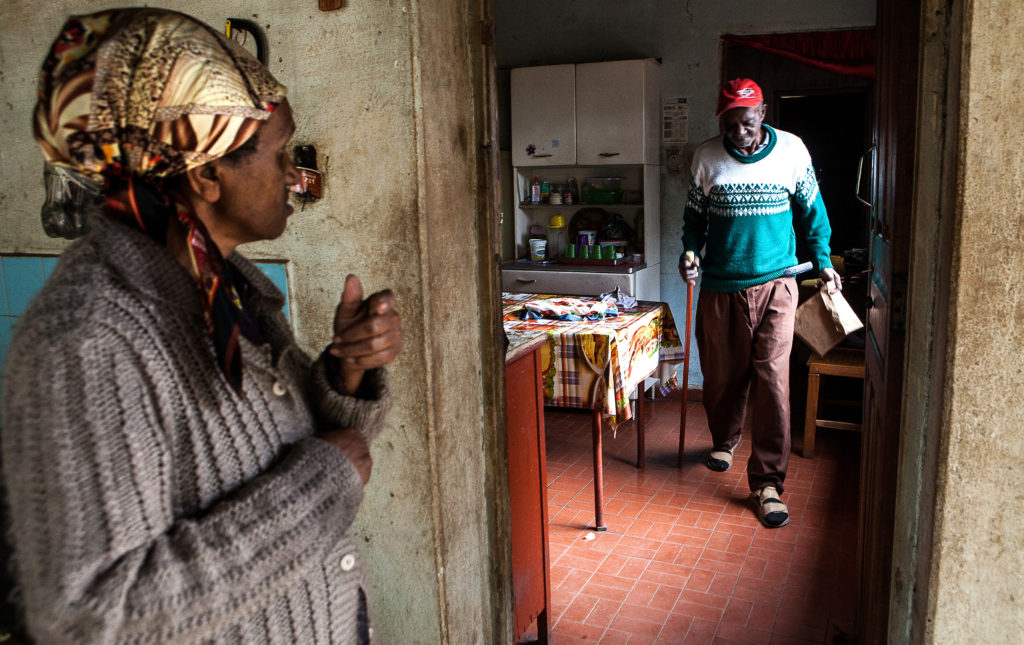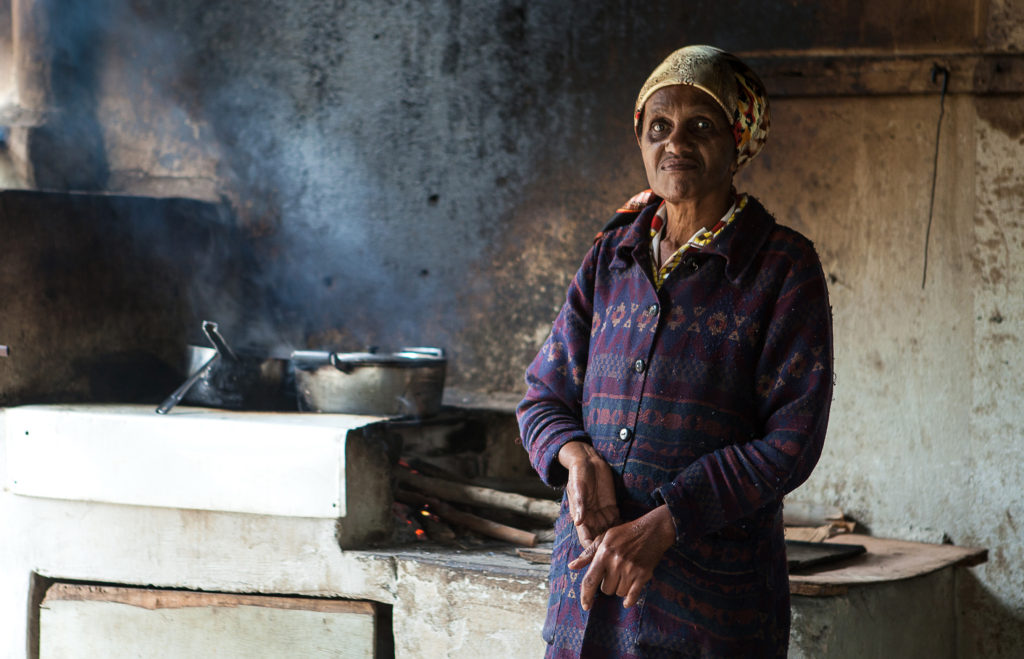For more than 20 years, coffee worker Ronaldo Vicente Antonio applied pesticides. From time to time, he got some on his hands, and wore the same work clothes for days at a time without washing them. He had to stop working when his feet became numb and his hands would no longer obey him.
Ronaldo Vicente Antonio used to live on a coffee plantation with his wife and four children. He worked there year-round, planting coffee bushes, picking coffee, and drying beans. Every April, he would apply pesticides.
“I sprayed every day, starting in the early morning”. It took hours, and sometimes the whole day, he says. He carried the pesticides in a dispenser on his back.

Ronaldo Vicente Antonio has to use a cane when he walks. His feet are numb, and he cannot control the movement of his hands. For many years, he applied pesticides on a Brazilian coffee plantation without sufficient protective equipment. Photo: Maurilo Clareto Costa.
He was never given instruction in how to handle the chemicals, he says.
“There was no training. The plantation owner’s son just told me, ‘Here’s the sprayer, and here’s the product. Go ahead and spray’”.
He wore his own rubber boots, along with ordinary clothes and a cloth hat that covered his neck. The plantation supplied him with a pair of plastic dishwashing gloves and a paper hospital mask. He used the same mask several days in a row. Sometimes the plantation ran out of masks, and he had to buy his own.
“I wore the same clothes two or three days in a row”, says Antonio. “There wasn’t time to wash them because the employee who had the afternoon shift had to use them, too.”
Today he struggles to walk and to coordinate the movement of his hands.
Took off gloves to rinse the pump
Like several other coffee workers Danwatch encountered, Antonio doesn’t know exactly what kind of chemicals he was spraying. He remembers applying the herbicide Roundup, as well as two pesticides that were sometimes mixed together. He did not know the reason the individual products were applied, nor what they were meant to prevent. He did think they were probably dangerous, however.
“I had heard that there could be problems with the pesticides, but I had to work”, Antonio says.
The pump for the pesticides often became clogged, and nothing would come out. “I had to take my gloves off to rinse the pump out, so I got the pesticides on my hands”, he explains.
Feet started to feel numb
After working for almost twenty years, Ronaldo Vicente Antonio’s feet began to feel numb.
“It felt like they were asleep”, he says. His legs weakened and hurt, and after a while the symptoms spread to his hands as well. He calls them ‘silly hands’. They won’t do what he wants them to. He has no strength in them and has a hard time coordinating their movement.
“Nowadays my wife has to button my shirt for me”, says Antonio.
When the symptoms began, he had a harder time doing his work on the coffee plantation, and became less productive.
“In the beginning, I didn’t worry, but then it became so painful that I couldn’t work. I was afraid that I might lose my job, because I had children to provide for”, he says.
“My bosses got mad.”
After many arguments, Antonio wanted to leave the plantation, but he didn’t know where to go or what to do, because he had lived there for many years and had no other home for his family. After several months of negotiations, he and his family left the plantation in 2005. At that time, the youngest of his four children was 12 years old.
Roof sealed with garbage bags
Today, ten years later, 74-year-old Ronaldo Vicente Antonio lives with his family in a dilapidated house where they have permission to live for free. In the bedroom, the roof is sealed with black garbage bags to keep out the rain and the cold, and the walls are covered in mould and mildew.

The wife of retired coffee worker Vicente Antonios, Maria das Dores Antonio, cooks on her stove. Photo: Maurilo Clareto Costa.
“It’s not a good house, but we don’t have any other home”, says his wife, Maria das Dores Antonio. She is angry that her husband worked for so many years on the plantation and now has nothing to show for it.
Antonio supports himself with a brown cane as he slowly and unsteadily puts one foot in front of the other. He says that he can no longer carry anything, because his legs give way underneath him.
Antonio’s doctor has told him that the problems in his legs are caused by osteoarthritis, but he has not ventured a diagnosis regarding Antonio’s hands. The doctor has never asked about his work with pesticides, and Antonio wonders to himself what could have caused his illness.
“I don’t know if it’s because of the pesticides,” he says. “I can’t help thinking that I might be healthy today if I hadn’t taken that job. But I had to do it to provide for my family. You have to accept what the gods give you”.
Brazilian Law – pesticides and protective equipment
According to a regulation by the Brazilian Ministry of Labour and Employment, employers are responsible for providing workers with protective equipment that corresponds to the level of risk to which the employee is exposed. The employer is also responsible for ensuring that the protective equipment is properly cleaned and in good working order before being used again; for prohibiting workers from applying pesticides while wearing their own clothes; and for educating workers about the correct handling of pesticides
http://www.guiatrabalhista.com.br/legislacao/nr/nr31.htm#31.8_Agrotóxicos,_Adjuvantes_e_Produtos_Afins__